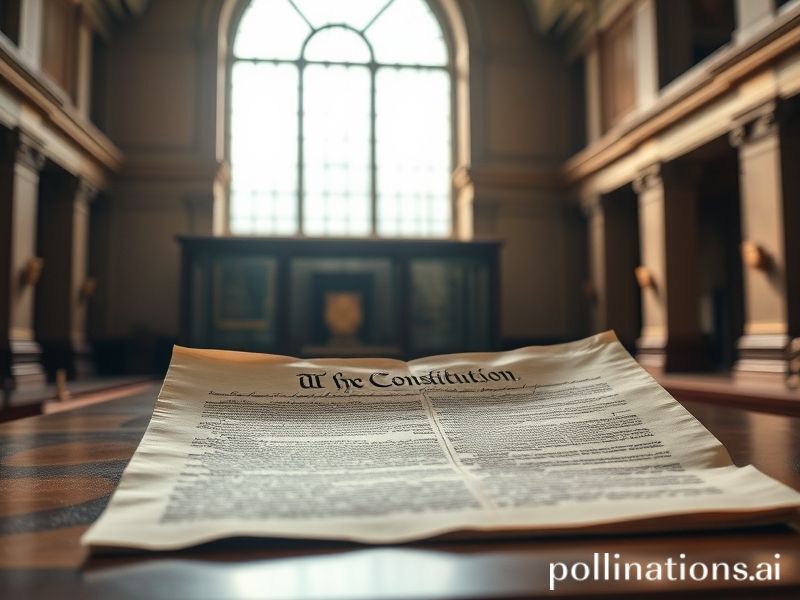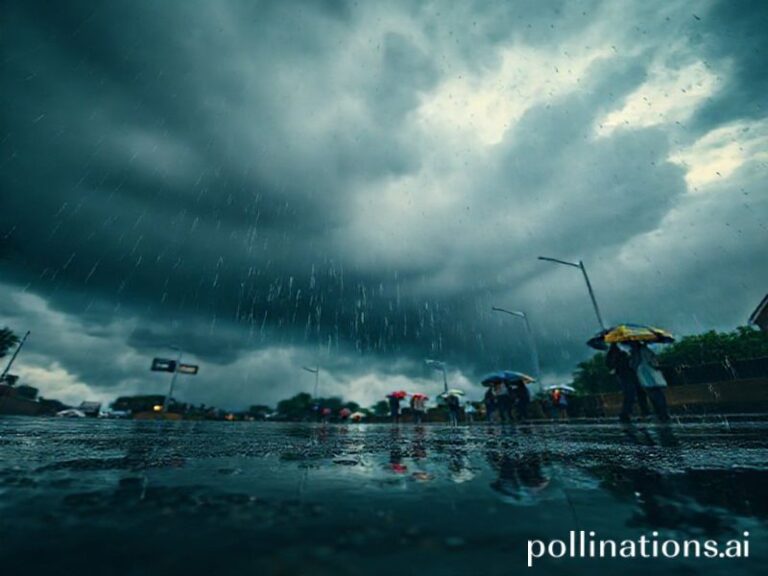The World Holds Its Breath While America Argues Over a 1787 Google Doc
When the United States sneezes, the rest of the planet reaches for a tissue—and occasionally a crash helmet. That truism is never more obvious than when Americans start quarrelling over their 236-year-old operating manual, formally known as the Constitution, informally known as “that parchment we weaponize when convenient.” From Lagos boardrooms to Kyoto classrooms, the document’s spasms are followed with the morbid fascination usually reserved for slow-motion train derailments or TikTok challenges involving kitchen appliances.
Europeans, who enjoy constitutional refreshers every time a coalition government collapses or a monarch forgets their lines, watch the U.S. ritual of originalism versus living-documentism the way one watches a Renaissance faire reenactment performed entirely with bazookas. The French, ever connoisseurs of revolutionary chic, privately relish the irony that their own founding text has been rewritten more often than the average Netflix password, while the American version still contains spelling errors the Framers were too busy wearing powdered wigs to notice.
Across the Pacific, China’s politburo finds the spectacle instructive: every filibuster, every Supreme Court leak, every tweetstorm from a senator who believes the Commerce Clause is a new cologne, becomes exhibit A in the PowerPoint deck titled “Why Liberal Democracies Eat Themselves.” Beijing’s constitutional scholars—yes, they exist, and yes, they drink baijiu while doing it—argue that gridlock is a feature, not a bug, baked into a system that treats compromise as a mortal sin and treats campaign donors like venture capitalists funding a start-up called Perpetual Outrage Inc.
Meanwhile, smaller nations have learned to hedge. When the U.S. Supreme Court sneezes on reproductive rights, Canadian pharmacies stock extra Plan B like it’s maple syrup futures. When American gun jurisprudence migrates abroad via YouTube tutorials, Australian customs agents start searching parcels for “constitutionally protected” rifle parts the way they once hunted for contraband fruit flies. The global supply chain of American constitutional culture, it turns out, is more efficient than the global supply chain of baby formula.
The international human-rights industry—a bustling bazaar of NGOs, philanthropists, and earnest interns—treats the Constitution as both lodestar and cautionary tale. Activists in Nairobi invoke the First Amendment when governments throttle the internet; activists in Geneva invoke the Second when American delegates arrive armed with metaphors rather than sidearms. The cognitive dissonance is delicious: the same sentence that protects a Florida blogger’s right to claim vaccines are made of lizard DNA is invoked by a Belarusian dissident facing a decade in a penal colony for retweeting a meme.
And then there is the tech sector, whose algorithms have become the Constitution’s newest, most bewildered interpreters. A Bolivian teenager scrolling Instagram learns that “Congress shall make no law” apparently does not extend to shadow-banning her K-pop edits; a Ukrainian coder discovers that the Fourth Amendment’s curbs on unreasonable search somehow don’t apply when the searcher owns a cloud server the size of Luxembourg. The Framers, who struggled with snail mail, would need a stiff drink and possibly a séance to grasp how their handwritten clauses now govern deepfake presidents and crypto militias.
What remains constant is the document’s uncanny knack for self-dramatization. Every generation of Americans believes its constitutional crisis is the constitutional crisis, the one that will finally tear the republic asunder or redeem it entirely. The rest of us, seasoned by centuries of American hyperventilation, watch with the weary patience of a bartender listening to a regular announce—again—that this time he’s really quitting tomorrow. Yet the stakes are real: when the U.S. Constitution hiccups, global markets tumble, alliances wobble, and dictators everywhere update their PowerPoint decks.
So we keep the popcorn ready. Because as long as the parchment survives, so does the global reality show, complete with commercial breaks and cliff-hangers no screenwriter would dare pitch. The Constitution may be the oldest written national charter still in use, but its true genre is episodic drama—season after season, reboot after reboot, with the entire planet locked in as a captive, if slightly amused, audience.







